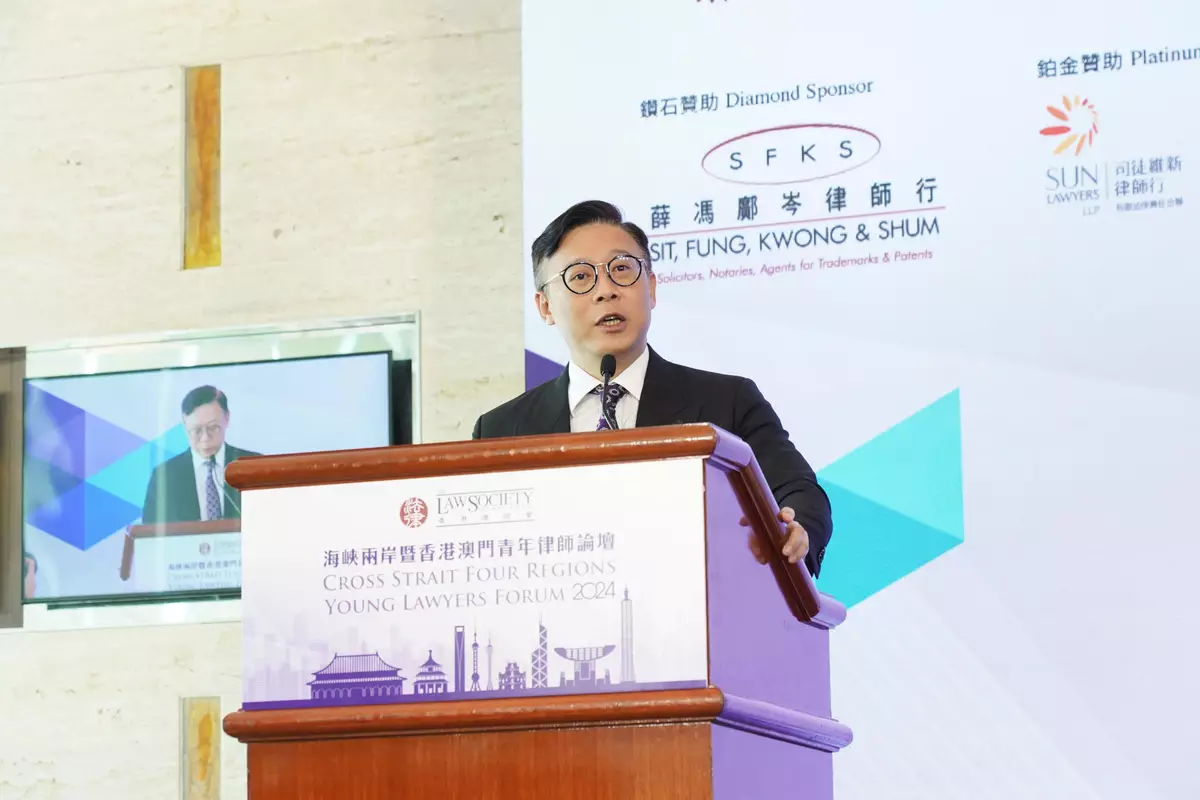Speech by DSJ at luncheon of Cross Strait Four Regions Young Lawyers Forum 2024
Following is the speech by the Deputy Secretary for Justice, Mr Cheung Kwok-kwan, at the luncheon of the Cross Strait Four Regions Young Lawyers Forum 2024 today (September 20):
President Tong (President of the Law Society of Hong Kong, Mr Roden Tong), distinguished guests, ladies and gentlemen,
It is my pleasure to be here today to discuss the evolving roles of lawyers in an AI (artificial intelligence)-driven legal landscape, with a particular focus on the opportunities and challenges presented by the (Guangdong-Hong Kong-Macao) Greater Bay Area.
As AI becomes increasingly integrated into legal practices, lawyers are finding new ways to enhance their efficiency, improve client services, and embrace the challenges and opportunities presented by the development of the Greater Bay Area. Let me share with you some of the key opportunities and risks that lawyers must navigate in this evolving landscape.
Opportunities offered by AI
One of the most significant benefits of AI for lawyers is enhanced efficiency and productivity. AI technology can simplify legal tasks like reviewing documents and conducting research, tasks which traditionally consume substantial amount of time. By automating these tasks, lawyers can handle a higher volume of cases, catering to the dynamic market of the Greater Bay Area, where rapid economic growth demands quick legal solutions.
AI-powered document review tools can quickly analyse thousands of pages of contracts, leases, and other legal documents, identifying key terms, clauses, and potential issues. This allows lawyers to focus their attention on higher-level analysis and strategy, rather than getting caught up in tedious manual review. Similarly, AI-driven legal research tools can sift through vast databases of case law, legislations and regulations to find relevant precedents and authorities, saving lawyers hours of time.
I remember when I first started practicing law, I spent hours and hours poring over dusty law books and case files, searching for that one crucial piece of information that could make or break a case. It was tedious, time-consuming work that often left me feeling like I was drowning in a sea of paper. But now, with AI-powered research tools, I can find the relevant information I need in a fraction of time. It's like having a personal assistant who never gets tired and never complains.
Another exciting opportunity lies in data-driven decision making. AI integration enables lawyers to employ predictive analysis, using past data to anticipate outcomes. By analysing past cases and judicial trends, AI can help lawyers predict the likely outcomes of a case and develop more effective litigation strategies. This data-driven approach can also assist in negotiating better settlements and advising clients on the risks and benefits of pursuing legal action. In a region as economically vibrant and legally complex as the Greater Bay Area, having this kind of analytical edge can be a game changer for law firms.
AI also has the potential to improve access to justice by reducing legal costs. In regions where legal fees can be substantially high, AI-driven solutions can lower operational costs, making legal services more affordable for small businesses and individuals. By automating routine tasks and streamlining processes, AI can help law firms reduce their overhead expenses and pass those savings on to their clients.
The Greater Bay Area is characterised by its unique legal frameworks with the coexistence of different legal systems. AI can assist lawyers in navigating the complexities and differences in the interpretation and application of laws across the region. For example, AI tools can help in contract analysis and compliance checks, ensuring that businesses operating within the Greater Bay Area are in compliance with the legal frameworks across different jurisdictions. This cross-border legal service is a valuable asset for lawyers looking to serve clients in the Greater Bay Area.
By leveraging AI to analyse and compare the legal requirements in the Greater Bay Area, lawyers can more easily identify potential issues and ensure that their clients' contracts and transactions comply with all relevant laws and regulations. This can be particularly useful in areas like intellectual property, where different jurisdictions may have varying protections and registration requirements. AI can also help lawyers stay up-to-date with changes in the law across the region, ensuring that their advice remains current and accurate.
Finally, AI tools such as chatbots and virtual assistants are transforming client engagement by enabling lawyers to deliver prompt advice and assistance. This technology enables lawyers to focus on building relationships with clients, a crucial aspect in the culturally diverse Greater Bay Area, where understanding client needs is essential for delivering effective legal service.
By using AI to handle routine inquiries and provide basic information, lawyers can free up more time to engage with clients on a personal level, understanding their unique concerns and goals. This can lead to stronger lawyer-client relationships, higher client satisfaction, and increased client loyalty. In a region as competitive as the Greater Bay Area, where clients have many options for legal services, building strong relationships can be a key differentiator for law firms.
Challenges and risks
Despite the significant advantages that AI may bring to the legal field, its incorporation also introduces various challenges and risks that legal professionals must address. A primary concern is data security and privacy. The utilisation of AI systems in handling confidential client information raises critical concerns about data privacy and security. Lawyers are entrusted with the responsibility of ensuring that AI tools adhere to strict data protection regulations to safeguard client confidentiality, especially in regions like the Greater Bay Area where legal standards vary.
With the increasing reliance of law firms on cloud-based storage and AI-driven technologies, the vulnerability to cyber threats and data breaches escalates. Law firms are attractive targets for cybercriminals seeking valuable client data, which could comprise sensitive financial records, trade secrets and personal details. To mitigate these risks, lawyers must implement robust cybersecurity protocols such as encryption, multi-factor authentication and frequent software updates.
Moreover, AI systems can produce unreliable outputs, a phenomenon known as "AI hallucination", where the technology generates false information or cites non-existent cases. This phenomenon poses significant challenges for legal professionals, as these inaccuracies can lead to mistaken citations, misinterpretation of legal precedents and potentially harmful consequences for clients and cases. Lawyers must critically evaluate AI outputs to prevent errors and maintain rigorous fact checking and validation of AI generated content.
Using AI in the legal field can be very helpful because it makes things faster and easier. But there are also important moral concerns we need to think about. One big worry is that relying too much on AI might take away the human side of legal matters. Humans can understand feelings and emotions, something machines may struggle with. This could lead to less fair and compassionate legal decisions. Another concern is that AI may carry biases from the dataset that the AI tools are trained on. If not monitored, these biases could make legal outcomes unfair for some people. Lawyers must be vigilant in monitoring AI outputs to prevent perpetuating existing biases present in historical legal data.
One way to address this issue is through the development of ethical frameworks and guidelines for the use of AI in legal practice. These guidelines should cover topics such as data quality, algorithmic transparency, human oversight and accountability. Law firms should also consider appointing an AI ethics committee or designating a chief AI officer to oversee the firm's AI initiatives and ensure compliance with ethical standards.
As AI automates routine tasks, there is concern about job displacement within the legal profession. However, rather than replacing lawyers, AI is expected to augment their capabilities, allowing them to focus on more complex and strategic aspects of their work. This shift can lead to the development of new roles within the legal field, emphasising the need for continuous learning and adaptation.
While it is true that AI may phase out certain entry-level legal positions, it is unlikely to replace the need for skilled lawyers altogether. Instead, AI is expected to prompt a transformation in the essential skills and knowledge that lawyers must possess to excel in their field. Lawyers will need to develop stronger data analysis and AI oversight skills, as well as a deeper understanding of the ethical and regulatory implications of AI use in legal practice.
To adapt to this changing landscape, lawyers must dedicate themselves to continuous learning and professional advancement. This may involve taking courses in data science, machine learning and AI ethics, as well as attending conferences and workshops to remain abreast of the latest developments in legal technology. Law firms should also invest in training and developing programmes to help their legal teams acquire these new skills and stay competitive in the job market.
As AI becomes widely adopted in the legal profession, there will be increasing pressure from clients, regulators, and the public to ensure that these technologies are used in a safe, ethical, and transparent manner. Lawyers must stay informed about the latest developments in AI regulation, both in their home jurisdictions and across the Greater Bay Area, to ensure that their practices remain compliant.
Judiciary guidelines
Recently, the Hong Kong Judiciary has taken a significant step by issuing its very first guidelines for the use of generative AI among judges, judicial officials and support staff. This initiative aims to enhance the efficiency of judicial and administrative functions while firmly upholding the core principles of judicial independence, impartiality and accountability.
The guidelines include two main principles. First, it is imperative that judges must not delegate judicial responsibilities to AI and should exercise caution regarding data security and confidentiality when interacting with generative AI tools. Secondly, judicial staff must critically assess AI-generated outputs for factual accuracy, potential biases and intellectual property infringements, and accept full responsibility for their use.
While the Judiciary acknowledges the potential of generative AI for tasks like summarisation and administrative support, it warns of its limitations in legal research and analysis. AI operates on probabilities rather than a deep understanding of context, which can lead to inaccuracies, making it unsuitable for legal decision-making without robust safeguards and verification mechanisms in place.
Conclusion
In conclusion, the evolving roles of lawyers in the AI-driven legal landscape of the Greater Bay Area represent a fusion of tradition and transformation, of expertise and experimentation. By integrating AI technologies into their practices, lawyers can position themselves at the forefront of a rapidly evolving legal landscape, ultimately providing superior services to their clients in this dynamic region.
While embracing AI, legal professionals must remain vigilant about the potential risks and limitations associated with the use of AI, particularly regarding data security and ethical considerations. Effectively navigating these challenges is essential for ensuring that the legal profession maintains its commitment to innovation and high-quality client service, while safeguarding the integrity of the legal system.
To thrive in this era, lawyers need to adapt by acquiring new skills and proactively exploring AI's potential to enhance their practices. By embracing emerging technologies while upholding ethical standards, lawyers in the Greater Bay Area can significantly contribute to economic growth, social progress and equitable access to justice for all.
As I bring my speech to a close, let's raise a virtual toast to AI in law, because who doesn't want a robot intern who never sleeps? Thank you for your time and participation. I wish everyone a fruitful and inspiring conference filled with valuable insights and connections. Thank you very much.

Speech by DSJ at luncheon of Cross Strait Four Regions Young Lawyers Forum 2024 Source: HKSAR Government Press Releases

Speech by DSJ at luncheon of Cross Strait Four Regions Young Lawyers Forum 2024 Source: HKSAR Government Press Releases








